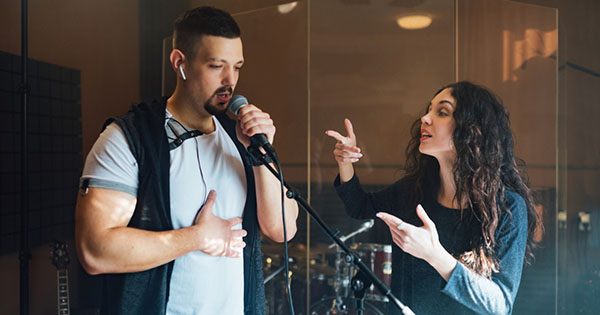Teachers often put their own vocal development on the backburner to focus on their students. But vocal coaches can benefit enormously from having singing lessons themselves.
We purchase books and journals, attend courses and conferences, and absorb podcasts and blogs, all in the name of furthering our understanding of the voice and providing our students with the most informed training. But how many of us have voice lessons ourselves?
ALEXA TERRY shares eight reasons why vocal coaches should add voice lessons to their Continuing Professional Development routine.
1 Continued development
The singing teacher usually arrives at destination ‘vocal pedagogue’ with performance experience or a relationship with ‘voice’ packed in their suitcase. But often the demands of teaching mean that over time the singing teacher’s own voice can be left moth-eaten at the bottom of the bag.
By investing in their own vocal development, a teacher can maintain their voice so that it is in good shape should demonstration be required with a student during a lesson.
Furthermore, having singing lessons with different coaches allows teachers to experience a variety of approaches that they can then draw on and use in their own studio.
2 Vocal health
Teaching singing is a vocally tiring vocation that involves talking, giving instruction, offering demonstrations, and continuously telling Beryl to stop pulling Jenny’s hair during junior choir sessions.
As we know, the voice responds to our physical and emotional environments. Therefore, equipping ourselves with a vocal coach means we have help in eliminating unnecessary tension from days of vocal loading. It will also help us to kick bad habits to the kerb, navigate obstacles that may arise with age and life’s plot twists, and maintain a healthy, robust and reliable instrument.
3 Two sets of ears are better than one
Understanding the intricacies of vocal anatomy and voice science does not automatically make someone a good singer. However, this knowledge can make for a more ‘aware’ singer.
Since becoming a vocal coach, I have experienced a more conscious response to my own voice. I also have a better understanding of how to interpret the sensations I encounter when singing.
However, two sets of ears are better than one. Connecting with a vocal coach who can offer us their insight, can help us to connect the theory to the practical.
4 Coaching help
When we book in with a fellow vocal coach, the session is ours to do with as we please; it doesn’t always have to involve developing our own voice. We could discuss challenges that we are facing in our own studio, whether that be to do with business building or how to conduct tricky conversations with students or their parents.
We may find it helpful to get feedback on our own teaching by sharing recordings of our lessons and analysing voices together to find the best solution for the singer.
Note: To comply with data protection laws, you must have permission from your student to share lesson recordings. I provide all new students with a short handout that explains my studio policies. This handout includes a box that the student – or their parent – can tick and sign to grant permission for their lesson recordings to be shared with third parties.
5 Mentorship
After working with a fellow coach for a few sessions, you may find that they become a mentor – your very own ‘Voice Yoda’. Suppose you are fortunate enough to strike up such a relationship. In that case, you will enjoy ongoing support from a confidante who cheers you on from the sidelines, provides accountability for your goals and boosts your motivation.
6 Opportunities
Building relationships with other vocal coaches is a form of networking and, as a result, can open up new opportunities. It might lead to gigs, coaching in a new environment or writing and speaking engagements – all opportunities that may help to build or enhance your reputation.
7 Integrity
By having singing lessons yourself, you are demonstrating that you ‘practice what you preach’. Whatever you may be working on with your vocal coach, whether its stylistic exploration or taming tongue tension, sharing your journey with clients and social media followers shows you are dedicated to your craft.
It also busts the myth that all singing teachers have flawless voices and never make mistakes which, as a result, may reduce fear in our students, thus indirectly benefitting their lessons.
8 Empathy
Voice lessons are a great way for teachers to step into their students’ shoes. Our level of empathy may well increase as we understand what it’s like to sing in front of other people. (It can be scary for us too, right?). We have our own experiences to draw upon to make us relatable to the student.
If you have any questions or comments you can share them on the BAST Trainers Facebook group.




